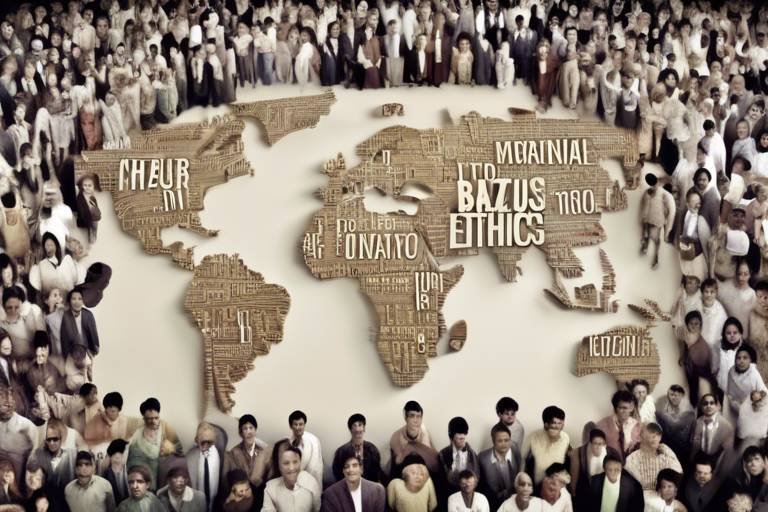Unraveling the Morality of Blood Sports
Blood sports have long been a topic of heated debate, stirring emotions and challenging our moral compass. From ancient gladiatorial games to modern-day bullfighting, these activities raise profound questions about the ethics of using living beings for entertainment. Are we merely spectators of tradition, or are we complicit in an age-old cycle of violence? This article delves deep into the ethical implications of blood sports, exploring the arguments both for and against their practice, their societal impacts, and potential alternatives that could satisfy cultural needs without compromising moral standards.
To truly understand the morality of blood sports, we must first look back at their historical roots. Blood sports have been intertwined with human civilization since ancient times. In the Roman Empire, gladiators fought not just for survival, but for glory and fame, while spectators reveled in the thrill of the hunt. Fast forward to today, and we find similar spectacles, albeit with a modern twist. The evolution of these activities reflects changing societal values and attitudes towards violence and entertainment. As we peel back the layers of history, we uncover a tapestry woven with cultural significance, economic motivations, and ethical dilemmas.
Supporters of blood sports often argue that these activities are not just mere entertainment; they are a celebration of tradition and cultural identity. For many communities, blood sports serve as a link to their heritage, fostering a sense of belonging and continuity. Additionally, there are economic arguments that cannot be ignored. Blood sports can attract tourism, create jobs, and support local businesses. But what does this mean for society as a whole? Are we willing to sacrifice ethical considerations for economic gain?
When discussing blood sports, one cannot overlook the economic implications. Proponents frequently highlight how these activities can generate significant revenue. Consider the following:
| Economic Benefit | Description |
|---|---|
| Tourism | Blood sports often attract tourists, eager to witness these events, thus boosting local economies. |
| Job Creation | From event organizers to local vendors, blood sports can create numerous job opportunities. |
| Community Support | Local businesses benefit from increased foot traffic and sales during events. |
These financial arguments present a compelling case for maintaining blood sports in certain communities. However, they also raise questions about prioritizing profit over ethical considerations.
For many, blood sports are not just activities; they are deeply embedded in cultural heritage. They shape identities and foster community bonds. The thrill of the chase or the excitement of a well-fought battle can unite people in ways that few other activities can. Yet, this cultural significance does not come without its challenges. As society evolves, so too must our understanding of what traditions we choose to uphold. Are we preserving culture, or are we perpetuating outdated practices that may no longer align with contemporary moral standards?
On the flip side, opponents of blood sports present strong ethical concerns that cannot be ignored. They argue that these activities inflict unnecessary suffering on animals and normalize violence in society. But what does this mean for our collective conscience? Are we, as a society, willing to turn a blind eye to the suffering of sentient beings for the sake of entertainment?
Critics argue that blood sports cause significant harm to animals, raising profound ethical questions about our responsibilities toward other living beings. The suffering inflicted on animals during these events is often deemed unnecessary and cruel. The moral implications of using sentient creatures for entertainment challenge our understanding of compassion and empathy. Shouldn't we strive to protect those who cannot protect themselves?
The normalization of violence through blood sports can have far-reaching effects on societal attitudes. Studies suggest that exposure to violent acts can desensitize individuals, shaping their perceptions of violence in broader contexts. This raises an alarming question: What kind of society are we fostering when we celebrate bloodshed as a form of entertainment? The implications extend beyond the arena, potentially influencing behaviors and attitudes in everyday life.
As society evolves, many are seeking humane alternatives to blood sports that maintain cultural significance without compromising ethical standards. From virtual simulations to theatrical performances, these alternatives can provide the thrill of competition without the associated violence. Engaging in cultural storytelling or participating in sports that celebrate skill and artistry can serve as fulfilling substitutes, allowing communities to honor their heritage while embracing compassion.
The future of blood sports remains uncertain as societal values shift. With increasing awareness of animal rights and ethical considerations, we may see changes in legislation and public opinion regarding these activities. The ongoing dialogue about morality in the realm of entertainment is crucial, as it shapes not only our cultural landscape but also our ethical framework. As we navigate this complex terrain, it is essential to consider the implications of our choices and strive for a balance that honors both tradition and compassion.
- What are blood sports? Blood sports refer to activities that involve the bloodshed of animals, often for entertainment purposes, such as bullfighting, dog fighting, and cockfighting.
- Why do people support blood sports? Supporters often cite cultural significance, tradition, and economic benefits as reasons for their support.
- What are the main arguments against blood sports? Opponents argue that blood sports cause unnecessary animal suffering, normalize violence, and have negative societal impacts.
- Are there alternatives to blood sports? Yes, alternatives include virtual simulations, theatrical performances, and other forms of entertainment that do not involve animal harm.

The Historical Context of Blood Sports
Blood sports have been a controversial topic for centuries, with their origins tracing back to ancient civilizations. These activities, which often involve the hunting or fighting of animals, were not merely forms of entertainment; they were deeply intertwined with the social, cultural, and economic fabrics of the societies that practiced them. From the gladiatorial games of ancient Rome to the bullfighting spectacles in Spain, blood sports have evolved significantly, reflecting changing societal values and attitudes toward violence and entertainment.
In ancient times, blood sports served multiple purposes. They were a way to demonstrate strength, bravery, and skill, often celebrated in festivals or public gatherings. The Romans, for instance, used gladiatorial contests as a means to distract the populace from political issues while simultaneously showcasing the might of the Empire. These events were steeped in ritual and symbolism, making them more than just brutal displays; they were a reflection of the societal hierarchy and the values of the time.
As we traverse through history, we notice a shift in the perception of blood sports. During the medieval period, hunting became a popular pastime among the nobility, seen as a demonstration of status and power. The royalty and aristocracy engaged in these activities, often with the support of the lower classes who benefited economically from the hunting industry. This created a complex relationship where blood sports were both a privilege of the elite and a source of livelihood for the common folk.
Fast forward to the modern era, and the conversation around blood sports has become even more contentious. While some argue that these activities are a vital part of cultural heritage, others see them as outdated and cruel. The rise of animal rights movements has prompted many societies to reevaluate their stance on blood sports, leading to legislation in some regions that restrict or ban these practices altogether. For instance, countries like the UK have implemented laws against activities such as dog fighting and fox hunting, citing moral and ethical concerns.
To better understand the historical context of blood sports, we can look at the following table that summarizes key events and shifts in societal attitudes:
| Time Period | Blood Sports Activity | Societal Attitude |
|---|---|---|
| Ancient Rome | Gladiatorial Games | Celebrated as a demonstration of power and skill |
| Medieval Period | Noble Hunting | Seen as a status symbol and a source of livelihood |
| 19th Century | Public Bullfighting | Romanticized as cultural heritage |
| 21st Century | Animal Fighting Bans | Increasingly viewed as unethical and cruel |
In conclusion, the historical context of blood sports reveals a complex tapestry of cultural significance, societal values, and ethical considerations. As we continue to evolve as a society, the dialogue around blood sports becomes increasingly relevant, prompting us to reflect on what we value and how we define morality in the realm of entertainment.
- What are blood sports? Blood sports refer to activities that involve the hunting, fighting, or killing of animals for entertainment.
- Why have blood sports been historically significant? They have served various roles, including entertainment, status demonstration, and cultural identity throughout history.
- What are the current ethical concerns regarding blood sports? Major concerns include animal welfare, the normalization of violence, and the implications for societal attitudes toward cruelty.
- Are there alternatives to blood sports? Yes, many communities are exploring humane alternatives that preserve cultural significance without harming animals.

Arguments in Favor of Blood Sports
Proponents of blood sports often present a range of arguments that highlight their perceived benefits, emphasizing aspects such as tradition, cultural identity, and economic advantages. These advocates believe that blood sports are not merely violent spectacles but rather integral components of cultural heritage and community bonding. One of the most compelling arguments in favor of blood sports is their deep-rooted connection to tradition. For many communities, activities like bullfighting, cockfighting, and hunting are steeped in history, often passed down through generations. This sense of tradition fosters a unique cultural identity, binding people together in shared experiences and communal pride.
Moreover, blood sports can serve as a platform for cultural expression. In regions where these activities are prevalent, they often reflect the values and beliefs of the community. For instance, bullfighting in Spain is not just about the act; it's a celebration of art, bravery, and skill, intertwining with music, dance, and local festivities. This cultural significance cannot be overlooked, as it plays a vital role in maintaining the social fabric of these communities.
Another argument often put forward by supporters is the economic impact of blood sports. These activities can generate substantial revenue, contributing to local economies through tourism, job creation, and increased business for local vendors. Events centered around blood sports attract visitors from far and wide, eager to witness these traditions firsthand. The influx of tourists can lead to a booming hospitality sector, with restaurants, hotels, and shops benefiting immensely. For example, a well-publicized bullfighting season can bring thousands of visitors to a city, significantly boosting its economy.
| Economic Benefits of Blood Sports | Impact |
|---|---|
| Tourism Revenue | Increased visitors to local events |
| Job Creation | Employment opportunities in various sectors |
| Local Business Support | Boost in sales for restaurants, shops, and hotels |
While the ethical implications of blood sports are hotly debated, the economic arguments cannot be dismissed outright. Supporters argue that these activities provide livelihoods for many, and the revenue generated can be reinvested into the community, fostering development and growth. This perspective highlights a complex interplay between tradition, culture, and economics that is often overlooked in discussions focused solely on the ethical concerns surrounding blood sports.
In addition to economic considerations, blood sports can also foster a sense of community and belonging. Many supporters argue that these events bring people together, creating bonds and shared memories that strengthen social ties. For instance, local festivals featuring blood sports often involve the entire community, from organizing the events to cheering for their favorite participants. This collective experience can be a source of pride and identity, reinforcing the notion that blood sports are more than just violent entertainment—they are a celebration of community spirit.
In conclusion, while blood sports are contentious and raise significant ethical questions, the arguments in favor of them highlight their cultural, economic, and social importance to many communities. Understanding these perspectives is crucial in navigating the ongoing debate surrounding blood sports, as they reveal the complexities of tradition and modernity, culture and commerce, and community and individual values.

Economic Impact
The economic implications of blood sports are often touted as one of their strongest arguments for continued practice. Proponents claim that these activities not only provide entertainment but also stimulate local economies. Blood sports can create a ripple effect that boosts various sectors, from tourism to hospitality. For instance, events centered around blood sports attract visitors from far and wide, which in turn fills hotels, restaurants, and local shops. Imagine a bustling town square, filled with the sounds of excitement, laughter, and the aroma of delicious food wafting through the air—this is the scene that blood sports can create.
Moreover, blood sports can generate significant revenue streams through ticket sales, betting, and merchandise. Communities often rely on these funds to support public services and local infrastructure. In many cases, the revenue generated can be substantial enough to warrant a closer look at the economic benefits. To illustrate this point, consider the following table that outlines potential revenue sources associated with blood sports:
| Revenue Source | Estimated Contribution |
|---|---|
| Ticket Sales | $500,000 |
| Betting Revenue | $300,000 |
| Merchandise Sales | $200,000 |
| Tourism (Hotels, Restaurants) | $400,000 |
While the financial benefits are compelling, it's crucial to consider the broader implications. The economic argument raises questions about whether financial gain can justify the ethical concerns surrounding blood sports. Can we really place a price tag on the suffering of animals? Some argue that the economic benefits should not overshadow the moral responsibilities we hold towards other living beings. Furthermore, the reliance on blood sports for economic stability poses a risk; if societal attitudes shift against these practices, communities may find themselves in a precarious financial situation.
In summary, while the economic impact of blood sports is undeniably significant, it is essential to weigh these benefits against the ethical considerations. As we explore this complex issue, one must ask: Is it worth sacrificing our moral compass for the sake of economic gain? The answer may not be straightforward, but it certainly invites a deeper conversation about the values we hold as a society.
- What are blood sports? Blood sports refer to activities that involve the bloodshed of animals for entertainment purposes, such as bullfighting, dog fighting, and cockfighting.
- Why do some people support blood sports? Supporters often cite tradition, cultural significance, and economic benefits as reasons for their continued practice.
- What are the main ethical concerns surrounding blood sports? The primary concerns include animal rights, the normalization of violence, and the potential negative impact on societal attitudes toward violence.
- Are there alternatives to blood sports? Yes, many communities are exploring humane alternatives that preserve cultural significance without compromising ethical standards.

Cultural Significance
Blood sports are not merely brutal spectacles; they are woven into the very fabric of many cultures around the world. For countless communities, these activities represent a deep-rooted heritage that transcends generations. They often serve as a cultural touchstone, a way to connect with ancestors, and a means to celebrate collective identity. Imagine a vibrant festival where the air is thick with excitement, and the crowd roars as they witness a centuries-old tradition unfold before their eyes. This is not just entertainment; it’s a living history that shapes the identity of a community.
In various regions, blood sports are celebrated as part of local customs and rituals. For instance, in parts of Spain, bullfighting is seen as an art form, a dance between man and beast that showcases bravery and skill. Meanwhile, in parts of Asia, cockfighting is steeped in tradition, often accompanied by elaborate ceremonies that honor the birds and their trainers. These practices can foster a sense of belonging and pride among participants and spectators alike, reinforcing community bonds and shared values.
However, the cultural significance of blood sports is not without its complexities. While they may promote community cohesion, they also raise questions about the morality of such traditions. Are we preserving heritage at the cost of animal welfare? This dilemma often leads to heated debates within communities, pitting tradition against ethical considerations.
To better understand the cultural significance of blood sports, it’s essential to consider the following aspects:
- Identity and Tradition: Blood sports often embody the history and values of a community, serving as a reminder of their roots.
- Economic Benefits: These activities can stimulate local economies through tourism and related businesses, providing jobs and income for many.
- Social Cohesion: Participation in blood sports can unite people, creating a shared experience that strengthens community ties.
Ultimately, while blood sports may hold significant cultural value, they also challenge us to reflect on our ethical responsibilities. As society evolves, the conversation surrounding these practices becomes increasingly important. Can we honor our traditions while also advocating for humane treatment of animals? This question lingers in the air, prompting communities to navigate the delicate balance between cultural significance and ethical considerations.
- What are blood sports? Blood sports refer to activities that involve the killing or injuring of animals for entertainment purposes, often including bullfighting, dog fighting, and cockfighting.
- Why do some cultures participate in blood sports? Many cultures view blood sports as a part of their heritage, celebrating them as traditional practices that foster community identity and pride.
- What are the ethical concerns surrounding blood sports? Critics argue that blood sports inflict unnecessary suffering on animals and normalize violence, raising significant ethical questions about their continuation.
- Are there alternatives to blood sports? Yes, many communities are exploring humane alternatives that preserve cultural significance without compromising animal welfare, such as traditional festivals that focus on skill and artistry rather than violence.

Arguments Against Blood Sports
The debate surrounding blood sports is as fiery as the arenas where they take place. Opponents raise their voices against these activities, citing a myriad of ethical concerns that strike at the very heart of our humanity. One of the most compelling arguments against blood sports is the issue of animal rights. Critics argue that these activities inflict unnecessary suffering on animals, treating them as mere tools for entertainment rather than sentient beings deserving of compassion. Imagine a world where we celebrate life rather than revel in death; this is the vision that many animal rights advocates strive for. They believe that our moral responsibility extends beyond our species, urging us to consider the pain inflicted on animals for the sake of sport.
Moreover, the normalization of violence through blood sports poses another significant concern. When society allows such brutal displays to flourish, it risks desensitizing individuals to violence in general. Studies have shown that exposure to violent activities can alter perceptions and behaviors, leading to a troubling acceptance of aggression as a form of entertainment. This is not just a slippery slope; it’s a steep cliff that society might tumble down if we don’t tread carefully. The implications of this normalization can be profound, affecting everything from interpersonal relationships to broader societal norms.
In essence, blood sports do not exist in a vacuum. They are intertwined with societal values and can influence how individuals perceive violence and human-animal relationships. For instance, a recent survey indicated that individuals who regularly attend blood sports are more likely to express tolerance towards violence in other contexts. This raises an alarming question: are we, as a society, willing to accept the consequences that come with endorsing such practices?
Furthermore, the impact on public safety cannot be overlooked. Blood sports often attract crowds, leading to chaotic environments that can escalate into violence. Reports of injuries and altercations during these events are not uncommon, raising concerns about the safety of both spectators and participants. The potential for harm extends beyond the arena, affecting local communities and law enforcement resources.
In light of these arguments, it becomes clear that the ethical implications of blood sports are far-reaching. As we grapple with these issues, it’s essential to engage in open dialogue and seek alternatives that respect both cultural traditions and animal welfare. The challenge lies in finding a balance that honors our heritage without compromising our moral compass.
- What are blood sports? Blood sports refer to activities that involve the hunting, fighting, or killing of animals for entertainment purposes.
- Why do some people support blood sports? Supporters often cite tradition, cultural significance, and economic benefits as reasons for their advocacy.
- What are the ethical concerns regarding blood sports? Critics raise issues related to animal rights, normalization of violence, and public safety.
- Are there alternatives to blood sports? Yes, many communities are exploring humane alternatives that preserve cultural significance while respecting animal welfare.

Animal Rights Issues
The ethical implications surrounding blood sports often bring animal rights to the forefront of the debate. Critics of these activities argue that they inflict unnecessary suffering on animals, raising profound moral questions about our responsibilities as caretakers of other living beings. Imagine, for a moment, a world where animals are not merely seen as participants in entertainment but as sentient beings deserving of compassion and respect. This perspective challenges the very foundation of blood sports and prompts us to reconsider our values.
One of the most compelling arguments against blood sports is the idea that animals are subjected to extreme stress and pain for the sake of human amusement. For instance, consider the life of a bull in a bullfighting arena, or the fate of a dog in a dog-fighting ring. These scenarios are not just isolated incidents but rather indicative of a broader issue where the rights of animals are often overlooked in favor of tradition or profit. The question arises: at what cost do we cling to these traditions?
Moreover, the normalization of blood sports sends a troubling message about how society values life. When violence against animals becomes a spectacle, it can desensitize individuals to suffering, potentially leading to a culture that accepts violence in other forms. Research has shown that exposure to animal cruelty can correlate with increased tolerance of violence against humans. This connection raises critical concerns about the long-term societal impacts of blood sports.
To further illustrate the ethical dilemmas involved, let's consider some key points:
- Animal Suffering: Blood sports often involve physical harm and psychological distress for the animals involved.
- Legal Protections: Many countries have laws aimed at protecting animal welfare, yet blood sports frequently operate in legal gray areas.
- Public Sentiment: As awareness of animal rights grows, public opinion is increasingly turning against blood sports.
In light of these issues, the moral responsibility of humans toward animals cannot be overstated. We must ask ourselves: do we have the right to prioritize our entertainment over the well-being of another living creature? As society evolves, the push for more humane practices becomes ever more compelling. The question remains—can we find a balance between cultural traditions and ethical responsibilities? The answer may lie in a collective reevaluation of our values and the choices we make.

Violence and Societal Impact
The relationship between blood sports and societal violence is a topic that ignites passionate debates. Imagine a world where the thrill of the hunt or the fierce competition of animals fighting for survival is celebrated as entertainment. It’s a stark contrast to the values of compassion and empathy that many strive to uphold. Critics argue that indulging in such activities can normalize violence, creating a desensitized society where aggression is not only accepted but glorified. This raises an important question: when does entertainment cross the line into moral irresponsibility?
Research has shown that exposure to violent activities, including blood sports, can influence individuals' perceptions and behaviors. For instance, studies suggest that those who engage in or frequently watch violent sports may develop a skewed understanding of conflict resolution, viewing aggression as a viable solution to problems. This can lead to a range of societal issues, such as increased aggression in youth, desensitization to real-life violence, and even a rise in violent crime rates.
Furthermore, the impact of blood sports is not confined to the individuals who participate directly. The societal implications ripple outwards, affecting community norms and values. When violence is celebrated, it can lead to a culture that accepts brutality as a part of life. This acceptance can manifest in various ways, from increased tolerance for domestic violence to a general disregard for the suffering of others, both human and animal.
To illustrate this point, let’s consider a few statistics:
| Study | Findings |
|---|---|
| American Psychological Association | Exposure to violent media increases aggressive behavior in children. |
| Journal of Interpersonal Violence | Participants in violent sports showed a higher likelihood of endorsing aggressive solutions to conflicts. |
| National Institute of Mental Health | Desensitization to violence can lead to increased acceptance of violence in society. |
As we reflect on these findings, it becomes clear that the implications of blood sports extend far beyond the arena. They challenge us to consider the type of society we want to cultivate. Are we fostering a culture that promotes empathy and understanding, or one that thrives on violence and aggression? The answer to this question may very well shape the future of our communities.
In conclusion, the normalization of violence through blood sports presents significant challenges to societal values. It prompts a critical examination of what we deem acceptable in the name of entertainment and forces us to confront the moral implications of our choices. As we move forward, it’s essential to engage in conversations about the impact of our entertainment choices on our collective psyche and the future we envision for our society.
- What are blood sports? Blood sports refer to activities that involve the shedding of blood, typically involving animals, such as dog fighting, bullfighting, and cockfighting.
- How do blood sports affect societal attitudes towards violence? Blood sports can desensitize individuals to violence and may lead to a normalization of aggressive behaviors in society.
- Are there alternatives to blood sports that maintain cultural significance? Yes, many communities are exploring humane alternatives that celebrate cultural heritage without compromising animal welfare.
- What role do laws play in regulating blood sports? Legislation varies by region, with some areas implementing strict bans on blood sports while others continue to permit them under certain conditions.

Alternatives to Blood Sports
As society becomes increasingly aware of ethical considerations, many are seeking humane alternatives to traditional blood sports. The good news is that there are numerous options that not only respect animal welfare but also preserve the cultural significance these activities once held. Imagine a world where the thrill of competition and community bonding can exist without the bloodshed. This is not just a dream; it's becoming a reality in many places around the globe.
One of the most promising alternatives is the development of virtual sports. With advancements in technology, virtual reality (VR) and augmented reality (AR) have opened up new avenues for entertainment that mimic the excitement of blood sports without harming any living beings. For instance, VR simulations of traditional hunting or fighting can provide the adrenaline rush participants crave while allowing them to engage in a safe, controlled environment. These innovations not only satisfy the desire for competition but also attract a tech-savvy audience.
Moreover, communities can turn to traditional games and festivals that celebrate cultural heritage without the violence. Events like carnivals, parades, and artistic competitions can foster community spirit and cultural pride. These activities often involve elements of competition and showcase local talents, providing entertainment that uplifts rather than harms. By shifting the focus from blood sports to these vibrant festivals, communities can strengthen their bonds while promoting ethical values.
Another innovative alternative is the rise of animal-friendly sports. Activities such as agility competitions for dogs, where pets showcase their skills and training, have gained popularity. These events not only celebrate the bond between humans and animals but also emphasize training, discipline, and teamwork, creating a positive environment for both participants and spectators. Such alternatives can help reshape societal perceptions of animal involvement in sports, steering them towards more compassionate practices.
Lastly, educational programs that promote animal welfare and respect for life can serve as powerful alternatives to blood sports. By engaging younger generations in discussions about ethics and empathy towards animals, we can cultivate a culture that values life over violence. Workshops, school programs, and community outreach initiatives can help instill these values, paving the way for a future where blood sports are seen as outdated relics of a less enlightened time.
In conclusion, the alternatives to blood sports are not just viable; they are essential for a more ethical society. By embracing technology, celebrating culture, promoting animal-friendly activities, and prioritizing education, we can create a world where the thrill of competition exists alongside compassion and respect for all living beings.
- What are some examples of animal-friendly sports?
Examples include agility competitions for dogs, equestrian events, and various non-violent animal showcases that emphasize skill and training. - How can technology help replace blood sports?
Technological advancements like virtual reality can create immersive experiences that simulate traditional blood sports without harming animals. - What role do cultural festivals play in replacing blood sports?
Cultural festivals celebrate community and heritage through non-violent means, fostering togetherness and pride without the ethical concerns of blood sports. - Why is education important in this context?
Education raises awareness about animal welfare and ethical considerations, helping future generations understand the importance of compassion and respect for all living beings.

Conclusion: The Future of Blood Sports
The future of blood sports is a topic that elicits strong emotions and diverse opinions. As society becomes increasingly aware of animal rights and ethical considerations, the landscape surrounding these activities is shifting. Will blood sports continue to thrive, or are they on the brink of extinction? This question is at the heart of ongoing debates, as cultural traditions clash with modern ethical standards.
One thing is clear: the conversation surrounding blood sports is not going away anytime soon. With changing societal values, we may witness a gradual decline in the acceptance of these practices. Legislation is evolving, with many countries implementing stricter laws against animal cruelty. This shift reflects a growing recognition of the moral implications tied to blood sports and the need to protect vulnerable creatures.
Moreover, public opinion plays a crucial role in shaping the future of these activities. As more people advocate for animal welfare and humane treatment, the pressure on governments and organizations to reconsider their stance on blood sports intensifies. Could we see a future where blood sports are relegated to the annals of history? It’s a possibility that cannot be dismissed.
In light of these changes, many communities are exploring alternatives that honor their cultural heritage while aligning with ethical standards.
- Festivals celebrating traditional skills without violence
- Educational programs promoting animal welfare
- Artistic expressions that reflect cultural identity without harm
Ultimately, the future of blood sports will likely be shaped by a combination of legal reforms, shifts in public sentiment, and the emergence of more humane practices. As we navigate this complex terrain, it’s essential to engage in open dialogue, understanding that the morality surrounding blood sports is not black and white, but rather a spectrum of beliefs and values.
- What are blood sports? Blood sports refer to activities that involve the hunting or fighting of animals for entertainment, often resulting in injury or death.
- Why do some people support blood sports? Supporters often cite tradition, cultural significance, and economic benefits as reasons for maintaining these practices.
- What are the main arguments against blood sports? Opponents raise concerns about animal rights, the normalization of violence, and the potential negative impact on society.
- Are there alternatives to blood sports? Yes, many communities are exploring humane alternatives that celebrate cultural heritage without causing harm to animals.
- What does the future hold for blood sports? The future is uncertain, but shifting societal values and increasing advocacy for animal welfare suggest that blood sports may decline in acceptance.
Frequently Asked Questions
- What are blood sports?
Blood sports refer to activities that involve the hunting or killing of animals for entertainment purposes. These can include bullfighting, dog fighting, and cockfighting, among others. They often raise significant ethical questions regarding animal welfare and societal values.
- Why do some people support blood sports?
Supporters often argue that blood sports are a part of cultural heritage and tradition. They believe these activities foster community bonds and can provide economic benefits through tourism and local business support. However, these justifications are increasingly challenged by ethical concerns.
- What are the ethical concerns surrounding blood sports?
Opponents of blood sports raise serious ethical issues, particularly regarding animal rights. They argue that these activities cause unnecessary suffering to animals and contribute to the normalization of violence in society. Critics believe this can lead to desensitization toward cruelty and violence.
- How do blood sports impact society?
The impact of blood sports on society can be profound. They may influence societal attitudes towards violence and animal welfare, potentially leading to a culture that accepts brutality. Additionally, the economic benefits touted by supporters are often weighed against the moral implications of such practices.
- Are there alternatives to blood sports?
Yes, there are several humane alternatives to blood sports that maintain cultural significance without compromising ethical standards. These can include traditional festivals that celebrate culture through non-violent means, such as art, music, and sports that do not involve harming animals.
- What is the future of blood sports?
The future of blood sports is uncertain as societal values continue to evolve. Increasing awareness and advocacy for animal rights may lead to changes in legislation and public opinion, pushing for a shift away from these controversial practices towards more humane alternatives.



















